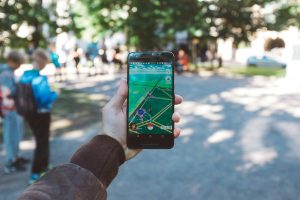4.2 Barriers to Effective Time Management
Stevy Scarbrough
Learning Objectives
Upon completion of this reading, you will be able to:
- Describe the dangers of multitasking and strategies for avoiding it.
- Assess the degree to which personal technology may help or hinder your study efforts.
- Identify procrastination behaviors and strategies to avoid them.
Distractions
Few things are more frustrating than trying to do work while distractions are going on around you. If other people are continually interrupting you or there are things that keep pulling your attention from the task at hand, everything takes longer and you are more prone to mistakes (McCoy, 2016)

Many people say they work better with distractions—they prefer to leave the television or the radio on—but the truth is that an environment with too many interruptions is rarely helpful when focus is required. Before deciding that the television or talkative roommates do not bother you when you work, take an honest accounting of the work you produce with interruptions compared to work you do without.
If you find that your work is better without distractions, it is a good idea to create an environment that reduces interruptions. This may mean you have to go to a private room, use headphones, or go somewhere like a library to work. Regardless, the importance of a distraction-free environment cannot be emphasized enough.
Family and Roommate Issues
Sometimes going to the library or elsewhere is not practical for studying, and you have to find a way to cope in a shared space.
Part of the solution is time management. Agree with others on certain times that will be reserved for studying; agree to keep the place quiet, not to have guests visiting, and to prevent other distractions. These arrangements can be made with a roommate, spouse, and older children. If there are younger children in your household and you have child-care responsibility, it’s usually more complicated. You may have to schedule your studying during their nap time or find quiet activities for them to enjoy while you study. Try to spend some time with your kids before you study, so they don’t feel like you’re ignoring them. (More tips are offered later in this chapter.)
The key is to plan ahead. You don’t want to find yourself, the night before an exam, in a place that offers no space for studying.
Finally, accept that sometimes you’ll just have to say no. If your roommate or a friend often tries to engage you in conversation or suggests doing something else when you need to study, just say no. Learn to be firm but polite as you explain that you just really have to get your work done first. Students who live at home may also have to learn how to say no to parents or family members—just be sure to explain the importance of the studying you need to do! Remember, you can’t be everything to everyone all the time.
Multitasking
Multitasking is a term commonly used for being engaged in two or more different activities at the same time, usually referring to activities using devices such as cell phones, smartphones, computers, and so on. Many people claim to be able to do as many as four or five things simultaneously, such as writing an e-mail while responding to an instant message (IM) and reading a tweet, all while watching a video on their computer monitor or talking on the phone. Many people who have grown up with computers consider this kind of multitasking a normal way to get things done, including studying. Even people in business sometimes speak of multitasking as an essential component of today’s fast-paced world.
It is true that some things can be attended to while you’re doing something else, such as checking e-mail while you watch television news, but only when none of those things demands your full attention. You can concentrate 80 percent on the e-mail, for example, while 20 percent of your attention is listening for something on the news that catches your attention. Then you turn to the television for a minute, watch that segment, and go back to the e-mail. But, you’re not actually watching the television at the same time you’re composing the e-mail; you’re rapidly going back and forth. In reality, the mind can focus only on one thing at any given moment. Even things that don’t require much thinking are severely impacted by multitasking, such as driving while talking on a cell phone or texting. An astonishing number of people end up in the emergency room from just trying to walk down the sidewalk while texting, so common is it now to walk into a pole or parked car while multitasking!


The perceived need to multitask is driven largely by the technology takeover of recent years. Smartphones, email, social networking, Instagram, TikTok . . . all make multitasking seem both necessary and possible. They all require switching in and out of a line of thinking. With these technologies, we face constant information overload and distraction.
Becoming More Productive
How can we become more productive with our time and energy, given our tendency to multitask? Read the tips below:
- Try “batch processing”: Have set times during the day for checking and responding to emails and texts.
- Use checking your phone as a reward for completing an item on your to-do list.
- Use concentrated time: Block off time for working on just one task.
- Leave your phone in your car. Then, take a break and check your phone, getting outside and getting a little exercise while you do it.
- Do what’s most important first: Make goals for the day and accomplish them. The sense of achievement can help you resist anxiety-driven multitasking.
- Turn off your social media alerts on your phone.
- Set your phone to “Do Not Disturb.”
- Set auto-response text messages to respond to people while you are studying.
- Use television, video games, etc. as a reward at the end of the day.
- Set a time when you are surfing the web, so you don’t spend hours going down the internet rabbit hole.
Estimating Task Time
One of the biggest challenges college students have with time management is accurately estimating how much time it will take to complete a task. We might think we’re going to be able to read an assigned chapter in an hour. But what if it takes three hours to read and understand the chapter? Having the skill to know how long a homework assignment will take is something that can be developed. But until we can anticipate it accurately, it is best to leave some time in our schedule in case it takes longer than we had anticipated.
We have a limited amount of time. Most of us cannot complete everything we wish to complete—either in a day or in a lifetime. We hear people say, “I wish there was more time” or “If there was more time, I would have done this.” We have enough time to do many of the things we wish to do. People run into difficulty when they spend time on things that are not the most important things for them.
When you are planning out your schedule for the day or the week, take a minute to ask yourself:
- What am I doing that doesn’t need to be done?
- What can I do more efficiently?
- What am I procrastinating? Can I do one thing to move that task forward?
Have you ever felt compelled to take a little bit of everything at a buffet or a family gathering, then all of a sudden felt fuller than you expected? In situations like this many people claim, “my eyes were bigger than my stomach.” This is also true with planning and goal setting. It may be that your plan is bigger than the day. Experiment with what you want to accomplish and what is realistic. The better you can accurately predict what you can and will accomplish and how long it will take, the better you can plan, and the more successful you will be.
Procrastination

Do any of the following descriptions apply to you?
- My paper is due in two days and I haven’t really started writing it yet.
- I’ve had to pull an all-nighter to get an assignment done on time.
- I’ve turned in an assignment late or asked for an extension when I really didn’t have a good excuse not to get it done on time.
- I’ve worked right up to the minute an assignment was due.
- I’ve underestimated how long a reading assignment would take and didn’t finish it in time for class.
- I’ve relied on the Internet for information (like a summary of a concept or a book) because I didn’t finish the reading on time.
If these sound like issues you’ve struggled with in the past, you might want to consider whether you have the tendency to procrastinate and how you want to deal with it in your future classes. You’re already spending a lot of time, energy, and money on the classes you’re taking—don’t let all of that go to waste!
Procrastination is a way of thinking that lets one put off doing something that should be done now. This can happen to anyone at any time. It’s like a voice inside your head keeps coming up with these brilliant ideas for things to do right now other than studying: “I really ought to get this room cleaned up before I study” or “I can study anytime, but tonight’s the only chance I have to do X.” That voice is also very good at rationalizing: “I really don’t need to read that chapter now; I’ll have plenty of time tomorrow at lunch.…”
Procrastination is very powerful. Some people battle it daily, others only occasionally. Most college students procrastinate often, and about half say they need help to avoid procrastination. Procrastination can threaten one’s ability to do well on an assignment or test.
The Reasons behind Procrastination
People procrastinate for different reasons. Some people are too relaxed in their priorities, seldom worry, and easily put off responsibilities. Others worry constantly, and that stress keeps them from focusing on the task at hand. Some procrastinate because they fear failure; others procrastinate because they fear success or are so perfectionistic that they don’t want to let themselves down. Some are dreamers. Many different factors are involved, and there are different styles of procrastinating.
Lack of Energy
Sometimes we just do not feel up to a certain task. It might be due to discomfort, an illness, or just a lack of energy. If this is the case, it is important to identify the cause and remedy the situation. It could be something as simple as a lack of sleep or improper diet. Regardless, if a lack of energy is continually causing you to procrastinate to the point where you are beginning to feel stress over not getting things done, you should definitely assess the situation and address it.

Lack of Focus
Much like having low physical energy, a lack of mental focus can be a cause of procrastination. This can be due to mental fatigue, being disorganized, or allowing yourself to be distracted by other things. Again, like low physical energy, this is something that may have farther-reaching effects in your life that go beyond the act of simply avoiding a task. If it is something that is recurring, you should properly assess the situation.
Fear of Failure
This cause of procrastination is not one that many people are aware of, especially if they are the person avoiding tasks because of it. To put it in simple words, it is a bit of trickery we play on ourselves by avoiding a situation that makes us psychologically uncomfortable. Even though they may not be consciously aware of it, the person facing the task is afraid that they cannot do it or will not be able to do it well. If they fail at the task, it will make them appear incompetent to others or even to themselves. Where the self-trickery comes in is by avoiding the task. In the person’s mind, they can rationalize that the reason they failed at the task was because they ran out of time to complete it, not that they were incapable of doing it in the first place.
It is important to note that a fear of failure may not have anything to do with the actual ability of the person suffering from it. They could be quite capable of doing the task and performing well, but it is the fear that holds them back.
The Effects of Procrastination
In addition to the causes of procrastination, you must also consider what effects it can have. Again, many of these effects are obvious and commonly understood, but some may not be so obvious and may cause other issues.
Loss of Time
The loss of time as an effect of procrastination is the easiest to identify since the act of avoiding a task comes down to not using time wisely. Procrastination can be thought of as using the time you have to complete a task in ways that do not accomplish what needs to be done.
Loss of Goals
Another of the more obvious potentially adverse effects of procrastination is the loss of goals. Completing a task leads to achieving a goal. These can be large or small (e.g., from doing well on an assignment to being hired for a good job). Without goals you might do more than delay work on a task—you may not complete it at all. The risk for the loss of goals is something that is very impactful.
Loss of Self-Esteem
Often, when we procrastinate we become frustrated and disappointed in ourselves for not getting important tasks completed. If this continues to happen, we can begin to develop a low opinion of ourselves and our own abilities. We begin to suffer from low self-esteem and might even begin to feel like there is something wrong with us. This can lead to other increasingly negative mental factors such as anger and depression. As you can see, it is important for our own well-being to avoid this kind of procrastination effect.
Stress
Procrastination causes stress and anxiety, which may seem odd since the act of procrastination is often about avoiding a task we think will be stressful in itself! Anyone who has noticed that nagging feeling when they know there is something else they should be doing is familiar with this.
On the other hand, some students see that kind of stress as a boost of mental urgency. They put off a task until they feel that surge of motivation. While this may have worked in the past, they quickly learn that procrastinating when it comes to college work almost always includes an underestimation of the tasks to be completed— sometimes with disastrous results.
Strategies to Combat Procrastination
Just as there are different causes, there are different possible solutions to procrastination. Different strategies work for different people. The time management strategies described earlier can help you avoid procrastination. Because this is a psychological issue, some additional psychological strategies can also help:
- Since procrastination is usually a habit, accept that and work on breaking it as you would any other bad habit: one day at a time. Know that every time you overcome feelings of procrastination, the habit becomes weaker and eventually, you’ll have a new habit of being able to start studying right away.
- Schedule times for studying using a daily or weekly planner. Commit to your study schedule in the same way you commit to other obligations like class time or school. Carry it with you and look at it often. Just being aware of the time and what you need to do today can help you get organized and stay on track.
- If you keep thinking of something else you might forget to do later (making you feel like you “must” do it now), write yourself a note about it for later and get it out of your mind.
- Counter a negative with a positive. If you’re procrastinating because you’re not looking forward to a certain task, try to think of the positive future results of doing the work, like getting a good grade or raising your GPA.
- Counter a negative with a worse negative. If thinking about the positive results of completing the task doesn’t motivate you to get started, think about what could happen if you keep procrastinating. You’ll have to study tomorrow instead of doing something fun you had planned. Or you could fail the test. Some people can jolt themselves right out of procrastination.
- On the other hand, fear causes procrastination in some people—so don’t dwell on the thought of failing. If you’re studying for a test, and you’re so afraid of failing it that you can’t focus on studying and you start procrastinating, try to put things in perspective. Even if it’s your most difficult class and you don’t understand everything about the topic, that doesn’t mean you’ll fail, even if you may not receive an A or a B.
- Study with a motivated friend. Form a study group with other students who are motivated and won’t procrastinate along with you. You’ll learn good habits from them while getting the work done now.
- Keep your studying “bite-sized”: When confronted with 150 pages of reading or 50 problems to solve, it’s natural to feel overwhelmed. Try breaking it down: What if you decide that you will read for 45 minutes or that you will solve 10 problems? That sounds much more manageable.
- Turn off your phone, close your chat windows, and block distracting Web sites. Treat your studying as if you’re in a movie theater—just turn it off.
- Set up a reward system: If you read for 40 minutes, you can check your phone for 5 minutes. But keep in mind that reward-based systems only work if you stick to an honor system.
- Study in a place reserved for studying ONLY. Your bedroom may have too many distractions (or temptations, such as taking a nap), so it may be best to avoid it when you’re working on school assignments.
- Use checklists: Make your incremental accomplishments visible. Some people take great satisfaction and motivation from checking items off a to-do list. Be very specific when creating this list, and clearly describe each task one step at a time.
- Get help. If you really can’t stay on track with your study schedule, or if you’re always putting things off until the last minute, see a college counselor. They have lots of experience with this common student problem and can help you find ways to overcome this habit.
Managing Your Free Time
You must make time for the things that are most important to you. In order to make time, you may need to decide you will not do something else. The ability to say “no” cannot be underestimated. It isn’t easy to say “no,” especially to family, friends and people that like you and whom you like. Most of us don’t want to say “no,” especially when we want to help. But if we always do what others want, we give others the power to control our lives, and we won’t accomplish the things that we want—the things that are most important to us.
Ask yourself:
- What am I doing that doesn’t need to be done?
- What can I do more efficiently?
Have you ever ordered an appetizer, salad, beverage or bread, then felt full halfway through your entree? In situations like this many people claim, “my eyes were bigger than my stomach.” This is also true with planning and goal setting. It may be that your plan is bigger than the day. Experiment with what you want to accomplish and what is realistic. The better you can accurately predict what you can and will accomplish and how long it will take, the better you can plan, and the more successful you will be.
Attributions
Student Success. Authored by: Mary Shier. Provided by: Pressbooks by BCcampus Located at: https://opentextbc.ca/studentsuccess/ License: CC BY 4.0
College Success. Authored by: Linda Bruce. Provided by: Lumen Learning. License: CC BY: Attribution
Online Learning. Authored by: Beverly Araujo. Provided by: Lumen Learning. Located at: https://courses.lumenlearning.com/wm-collegesuccess-2/chapter/online-learning/. License: CC BY: Attribution
Learning Framework: Effective Strategies for College Success. Author: Heather Syrett Provided by: Austin Community College Located at: https://oercommons.org/courseware/8434 License: CC BY-NC-SA 4.0
References
McCoy, B. R. (2016). Digital distractions in the classroom phase II: Student classroom use of digital devices for non-class related purposes. Journal of Media Education, 7(1), 5-32. https://en.calameo.com/read/00009178915b8f5b352ba

